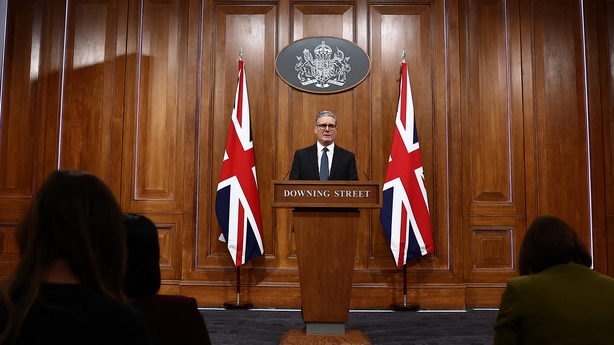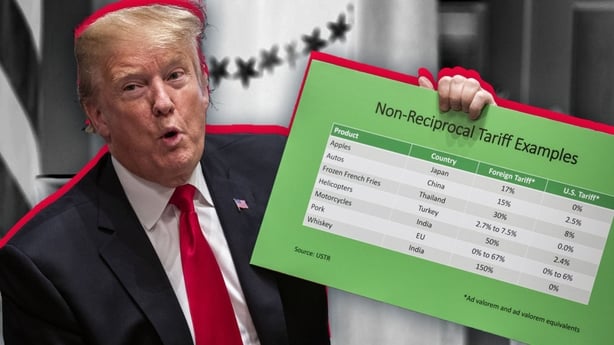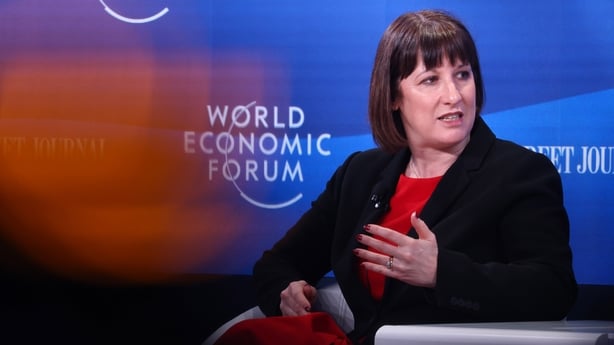The return of Donald Trump to the Oval Office has left many in Downing Street pondering how best to deal with the man many view as the disrupter-in-chief.
When Joe Biden became president in 2020, his first foreign visit was to the United Kingdom.
This week, Donald Trump himself also acknowledged that, traditionally, the UK is one of the first foreign trips for a new president.
There is an eagerness in Whitehall to secure a meeting between Prime Minister Keir Starmer and President Trump as quickly as possible.
Threats from Mr Trump to impose tariffs have understandably created a nervousness in the UK government, particularly given that its number one aim is to grow the economy.
This only adds to pressure on Mr Starmer to build good relations with the new president.
However, the past few days have also seen increased debate around a closer relationship between the UK and European Union.

The third largest party in the parliament, the Liberal Democrats, has gone as far as to call for the UK to rejoin the Customs Union. Although the government has firmly ruled this out.
But with Donald Trump directing much of his anger towards the EU, arguing that it has treated the US "very, very badly", can the UK forge closer ties with both major economies at the same time. Or is there a choice to make?
Closer ties with the European Union
This week, Britain's Business Secretary Jonathan Reynolds warned the US against imposing additional taxes on trade, arguing that the US has no goods trade deficit with the UK.
In the same interview with the BBC, he also spoke of an openness within the government to follow EU rules on food and farm products to reduce trade friction.
That policy is not a new one, it was a stated aim in the Labour Party's manifesto.
However, the possibility of the United Kingdom joining the Pan-Euro-Mediterranean Convention (PEM) was also mooted this week by European Trade Commissioner Maroš Šefčovič.
The PEM allows for tariff free trade among European and North African countries through common rules of origin.
Downing Street refused to rule out the possibility. Jonathan Reynolds went further, acknowledging that it would not break Labour's commitment not to rejoin the customs union.
Neither agreement would be a game-changer in terms of the UK or EU economy.
That is why Liberal Democrats leader Ed Davey believes that rejoining the customs union would be better, insisting that it would strengthen the UK's hand in any possible future trade negotiations or battles with Donald Trump.
Labour has made it clear though that the customs union is a no-go.

Will the UK look towards the US?
Professor Anand Menon, Director of the "UK in a Changing Europe" think-tank, believes there is an argument that if Donald Trump imposes tariffs on the EU, it could push the UK closer to the US.
"It is feasible that you end up with a scenario where he's levying tariffs on the EU that he isn't levying on the UK," he says.
According to Professor Menon, "the danger there is that the EU looks at us (the UK) and thinks, all right, we know what side you're on".
He said such a situation is reminiscent of when former French President Charles de Gaulle opposed Britain's accession to the EEC, believing the UK would be a "trojan horse" for American influence.
Read more:
Trump term two: Tariffs and tax threats loom over Irish economy
Taxes & tariffs: how might Trump policies hit Irish economy?
There is also a note of caution though from Professor Menon, who points out that what Donald Trump threatens doesn't always come to pass.
He warned that tariffs could have a negative impact on the US economy.
"It risks sparking inflation in the US. And the one thing we've learned from Biden is that inflation is politically toxic," Professor Menon said.
He also pointed out that a lot of Republicans will be looking towards the mid-terms, and they won't want to see policies implemented that could harm their electoral chances.
Britain's bid for growth
Donald Trump's return to the White House comes as the UK economy struggles to gather momentum.
Chancellor Rachel Reeves was in Davos this week, where she talked a big talk on growing the British economy.
She announced changes to her non-dom tax plans, meaning the phasing out of the tax benefit will be softer than originally promised.

Ms Reeves also spoke of the need to go "further and faster" in growing the UK economy, indicating too that she would back an expansion of Heathrow and Gatwick airports despite environmental concerns.
Earlier this month she also visited China to improve economic ties.
While it appears as though the UK is seeking to make many alliances in all corners of the world to achieve growth, some would fear that an aggressive Trump tariff policy could force the government into some uncomfortable decisions.
Last month Trump ally Stephen Moore warned that the UK would have to "choose" between the US and EU.
It is a binary choice that Prime Minister Keir Starmer rejected, arguing that improved relations with both can be achieved.
However, with threats of tariffs very much on the table, and tough talk from Donald Trump towards the EU, there's a sense among many that the UK may be facing tough choices ahead.







